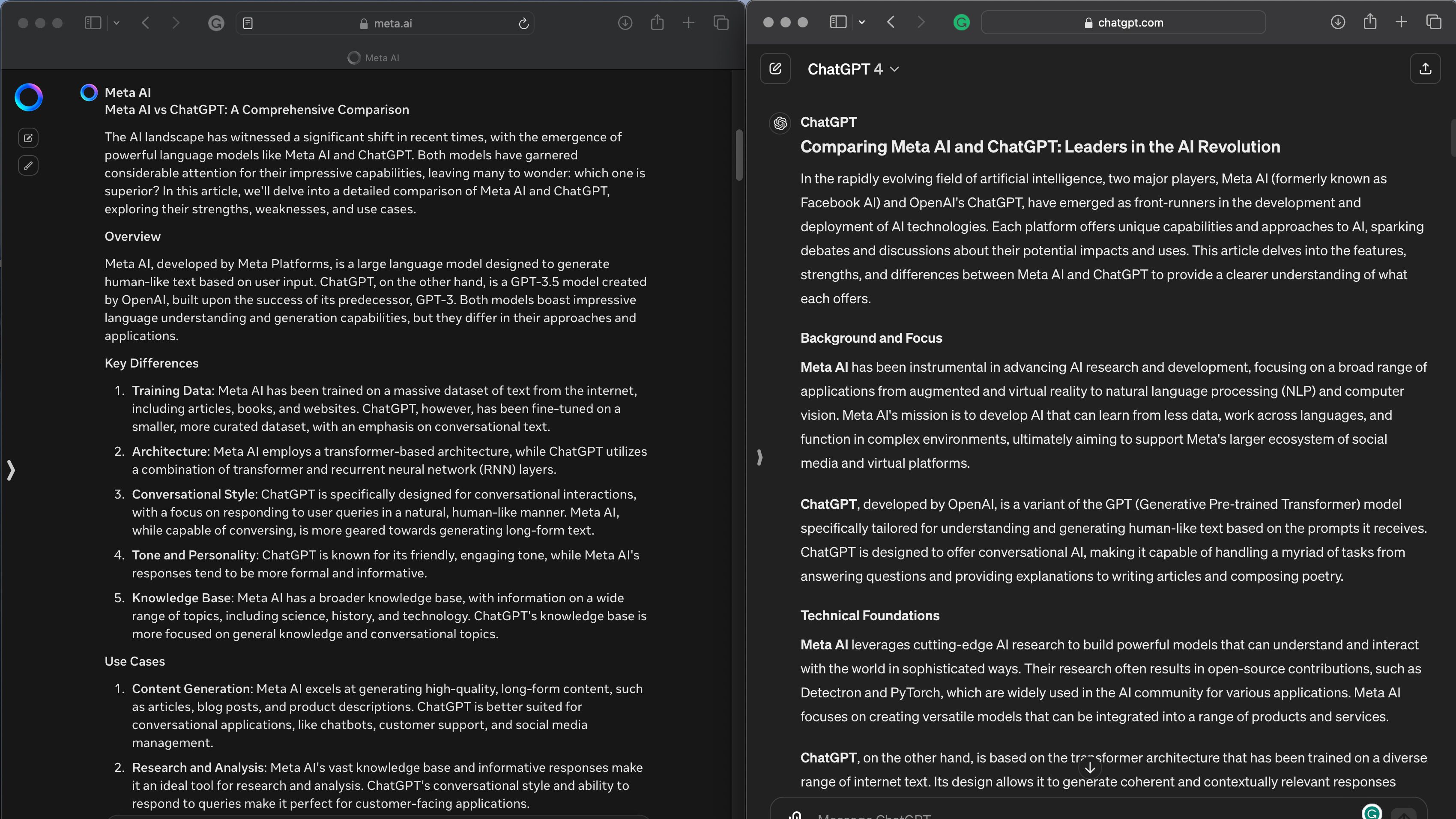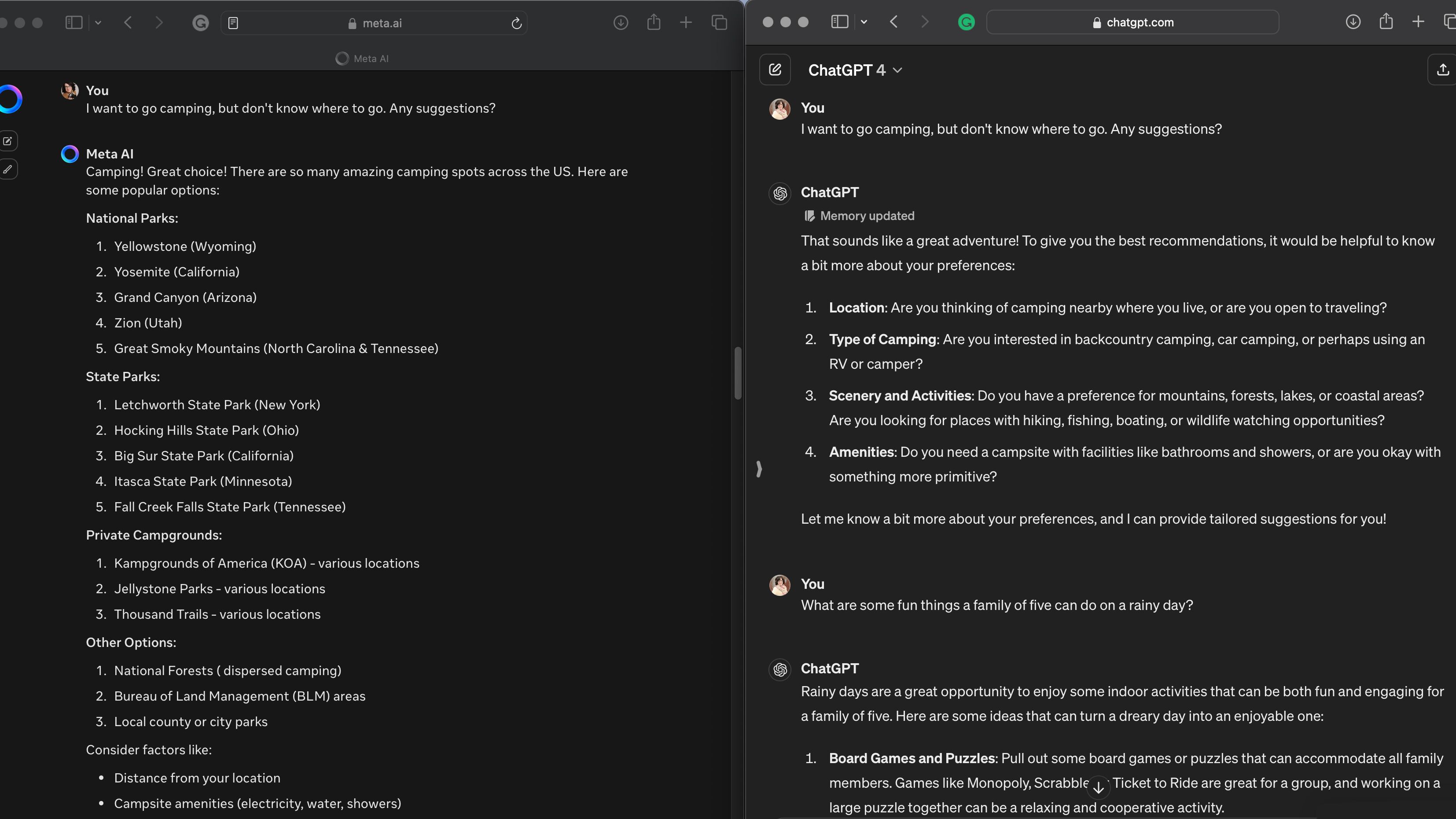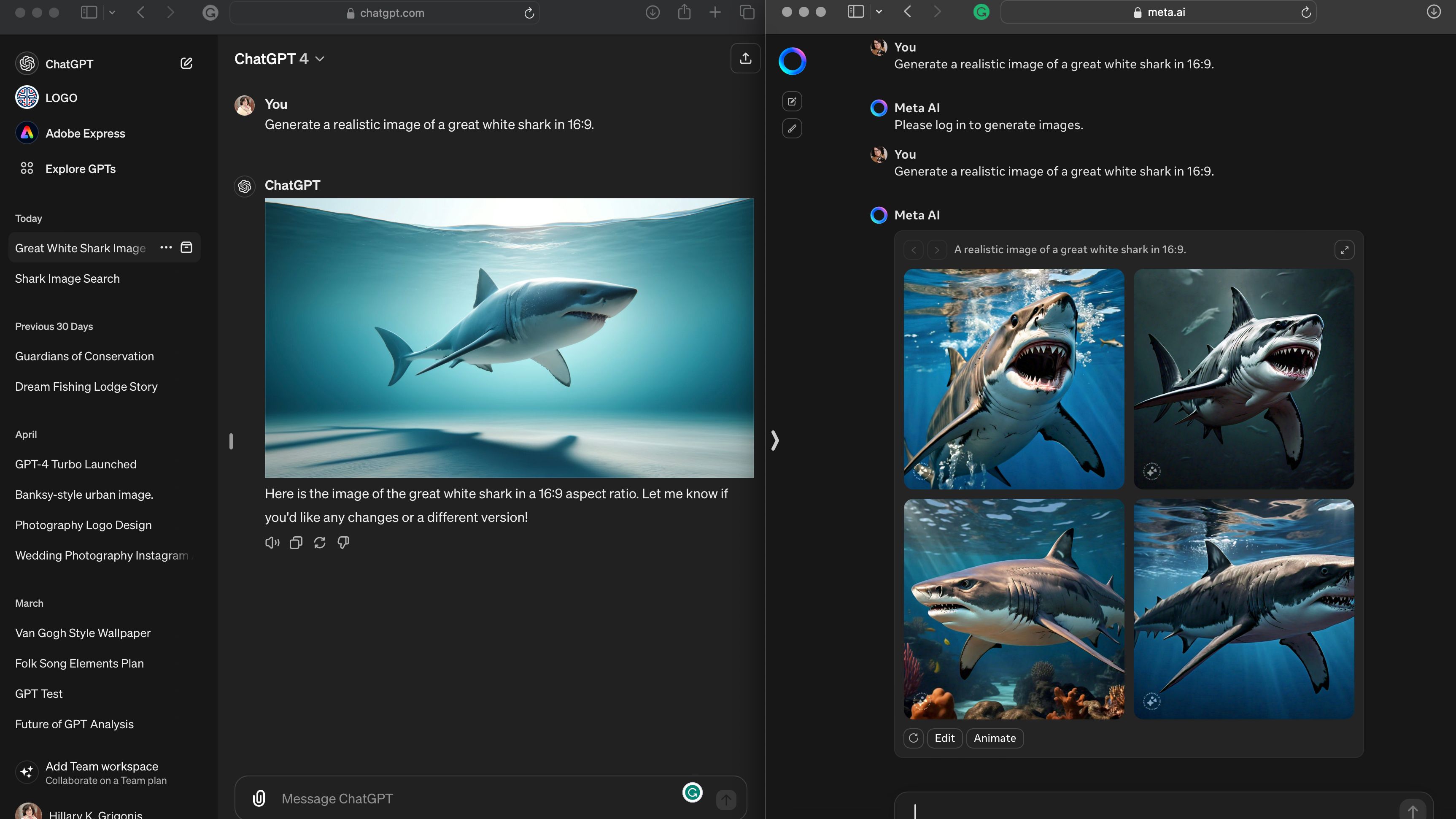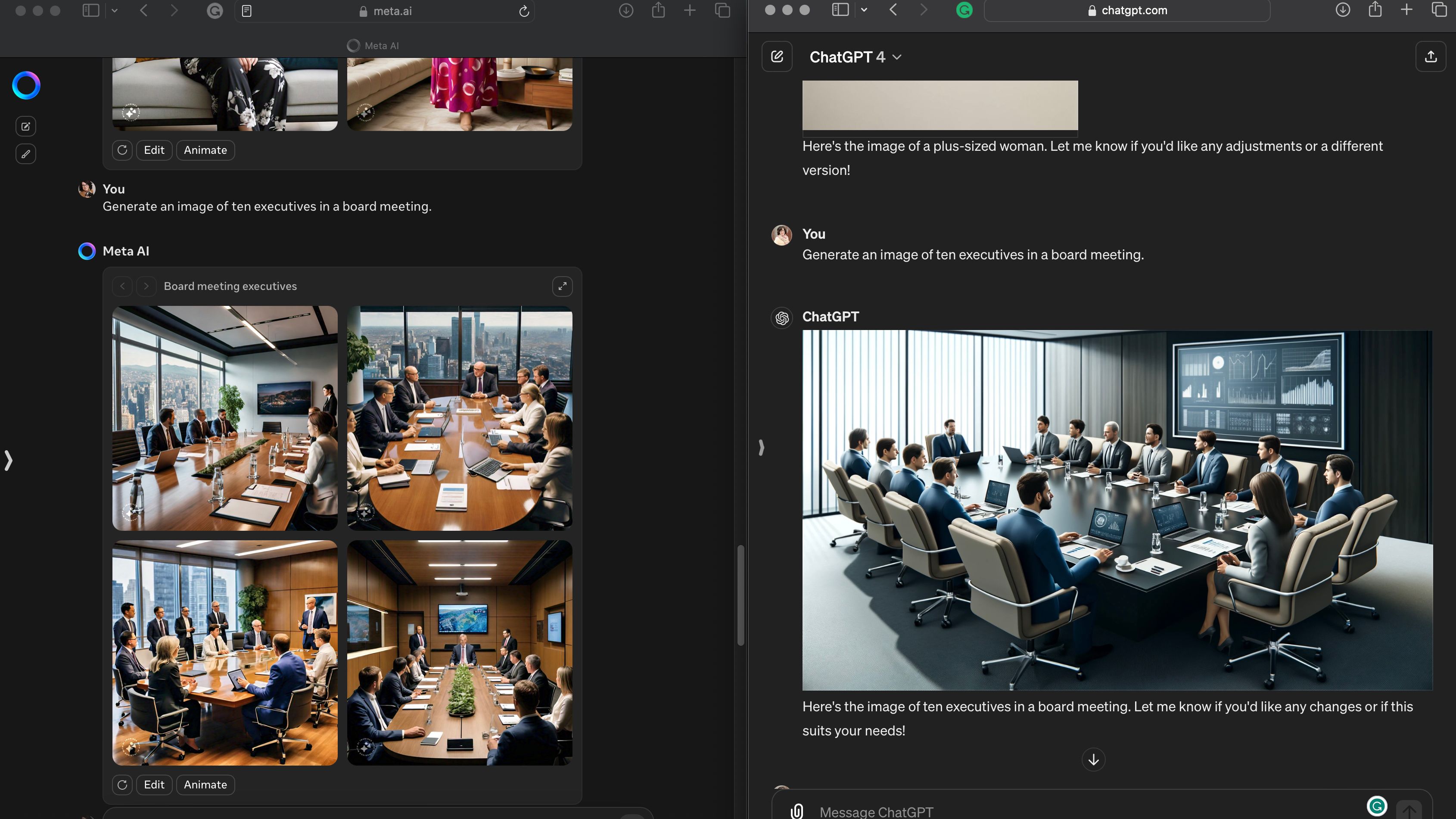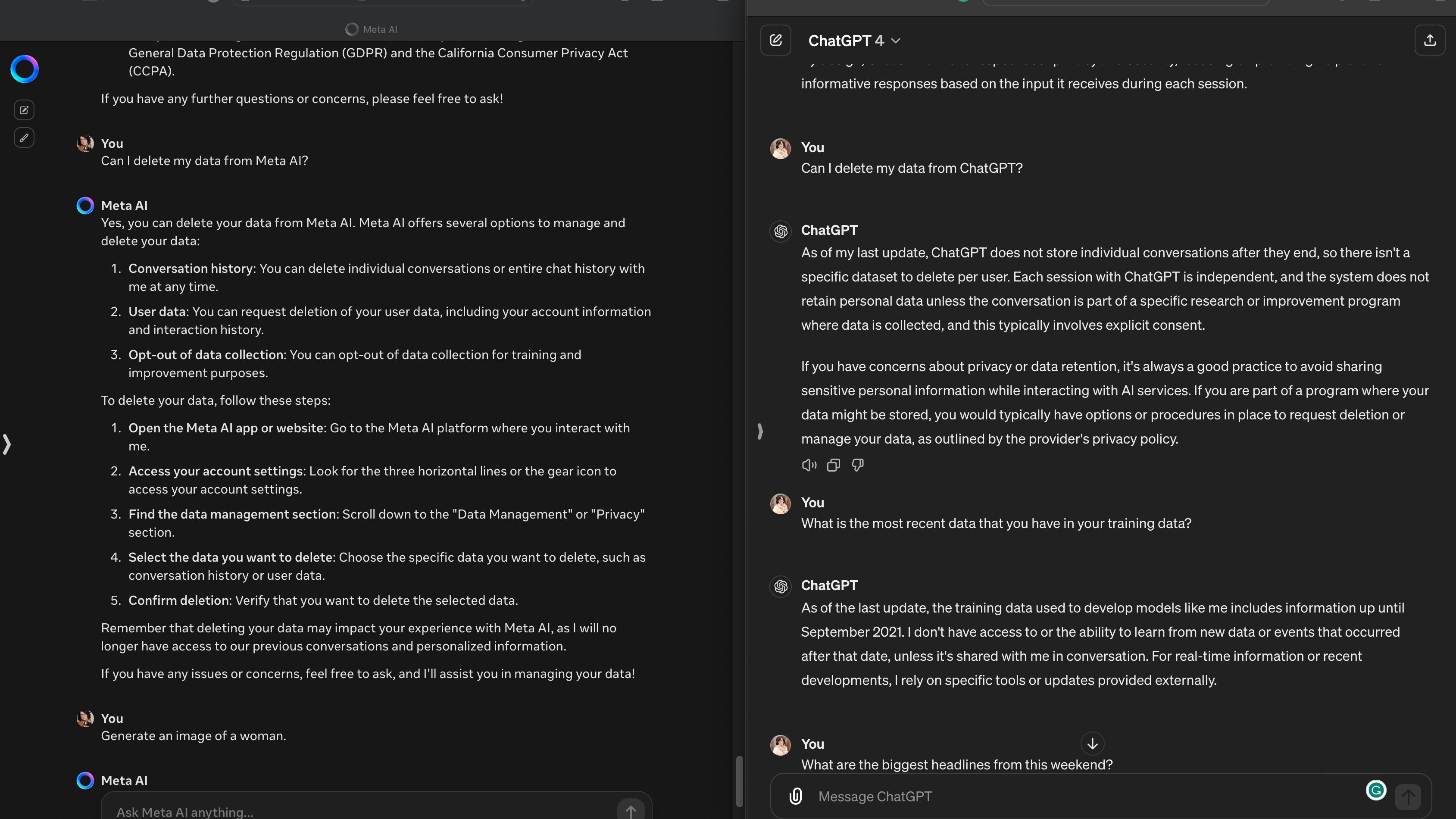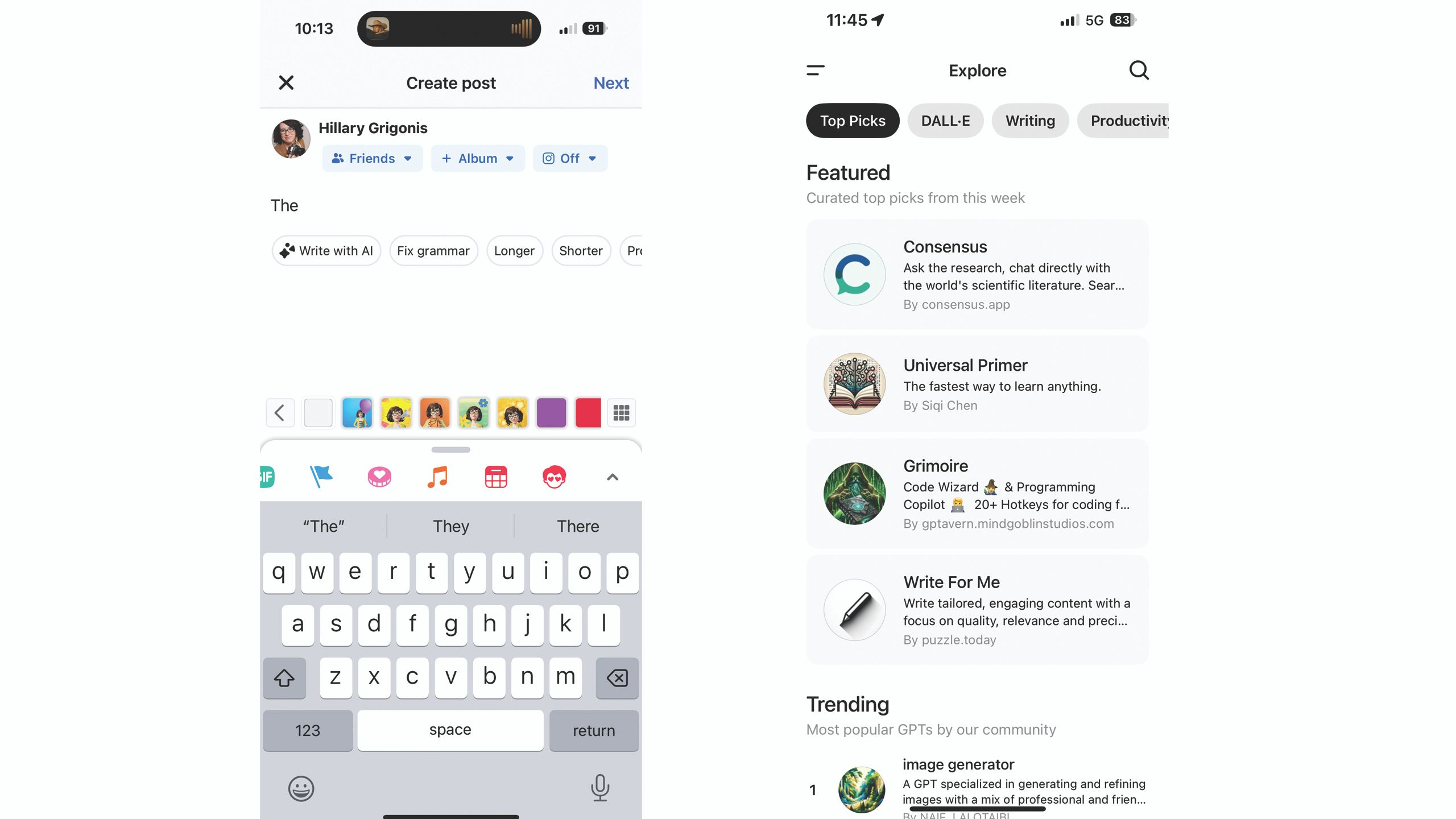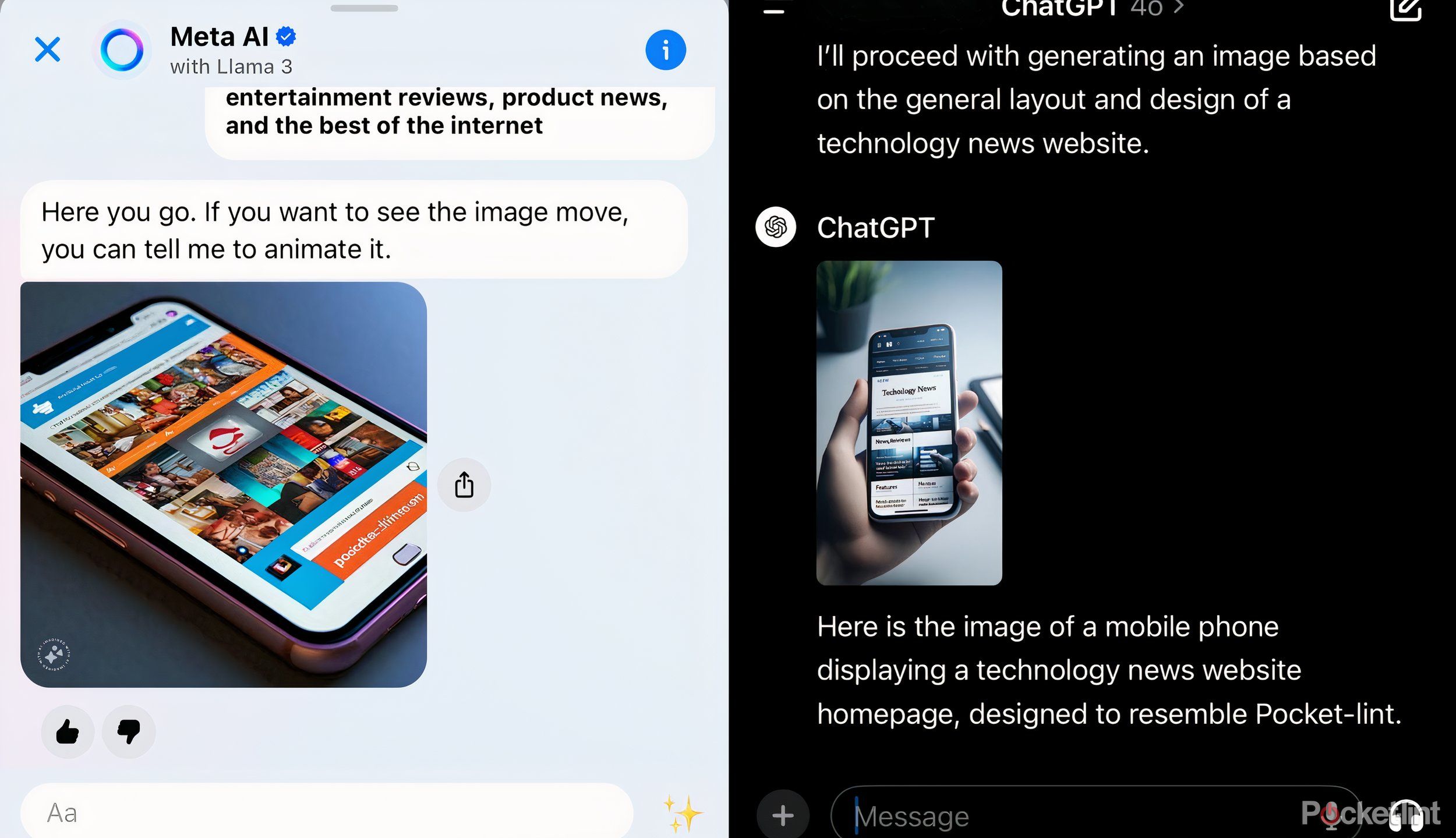Key Takeaways
- Meta AI is free, providing faster and up-to-date service compared to ChatGPT.
- ChatGPT excels in generating detailed writing and adhering to specific instructions.
- While Meta AI is free and faster, ChatGPT offers more detailed text results and customizable image generation.
ChatGPT is one of the most well-known artificial intelligence platforms. But one of the biggest new competitors is probably already on your smartphone (and no, you didn’t download it): Meta AI. Both ChatGPT and Meta AI are large language models that can assist with anything from writing an email to generating a photo. However, there are a few key differences when comparing ChatGPT and Meta AI.
Developed by the same company that owns Facebook, Instagram, and WhatsApp, Meta AI is a large language model that serves as an intelligent assistant in Meta’s social apps as well as its own web-based platform. After the company announced the AI platform in September 2023, it started rolling out AI features in its social apps in the spring of 2024. You can use Meta AI inside Facebook and Instagram as a chatbot, and you can also use the web platform to generate long-form text. Soon, the AI will be able to help you edit your photos before you share them or talk with a chatbot designed to imitate a celebrity.
ChatGPT, meanwhile, is a stand-alone platform. ChatGPT is designed to be a more conversational chatbot and is more likely to ask follow-up questions, but it’s still capable of generating long-form content. The platform’s longer history, with its 2022 launch, also means that, while you won’t find it integrated into Facebook, you can find hundreds of custom GPTs and use it with favorite plugins like Instacart or Google Chrome. You can use ChatGPT inside a web browser, or you can download the ChatGPT app.
I typed the same prompts into both programs to find out how the longstanding AI compares to the new social-based option in a ChatGPT vs. Meta AI head-to-head comparison.
I tested ChatGPT Plus against Copilot Pro to see which AI is better
I created a ChatGPT Plus vs. Copilot Pro battle to see which AI chatbot subscription service is really worth your $20 every month.
Affordability test: Let’s talk about cost
Meta AI is free, ChatGPT has both free and paid tiers
First, the elephant in the room: Meta AI is free.
While ChatGPT has a free tier, if you want all the best features, including the ability to generate images, you’ll need a $20 monthly ChatGPT Plus subscription. You can chat without paying, but subscribers have access to more features, the latest updates, and faster responses. ChatGPT has recently added more features for free users, but that still doesn’t include the ability to generate images.
But ChatGPT does a better job at listening to your specific instructions
If you don’t want to pay for a subscription, then there’s no contest: Meta AI will generate images for free, while a subscription is required for image generation with the DALL-E and ChatGPT integration. But if you don’t mind spending $20 for a platform that could potentially save you a lot of time, then there are a few nuances to note between the two platforms.
ChatGPT generates one image per prompt, while Meta AI creates four to increase the odds that you find something good. However, Meta didn’t always listen to instructions. For example, it didn’t understand that, when I asked for a 16:9 aspect ratio, I didn’t want a square image. It continued generating an Instagram-like ratio with no options to edit to the correct dimensions.
Meta’s images of humans looked more realistic, while ChatGPT’s looked more like paintings. Meta did surprisingly well at generating an image of a single person, even getting the fingers right. However, neither platform could create group photos, instead generating people with faces melting off like ice cream on a hot summer sidewalk.
One of my favorite tests for AI image generation is asking the program to create an image of a messy desk, because the more complex an image is, the more likely it is to produce some oddities. Both had issues representing a laptop keyboard correctly and were unable to generate text inside images that actually made sense.
Meta AI watermarks images so that it’s clear the image is machine-generated. That’s an ethical plus but may annoy some users.
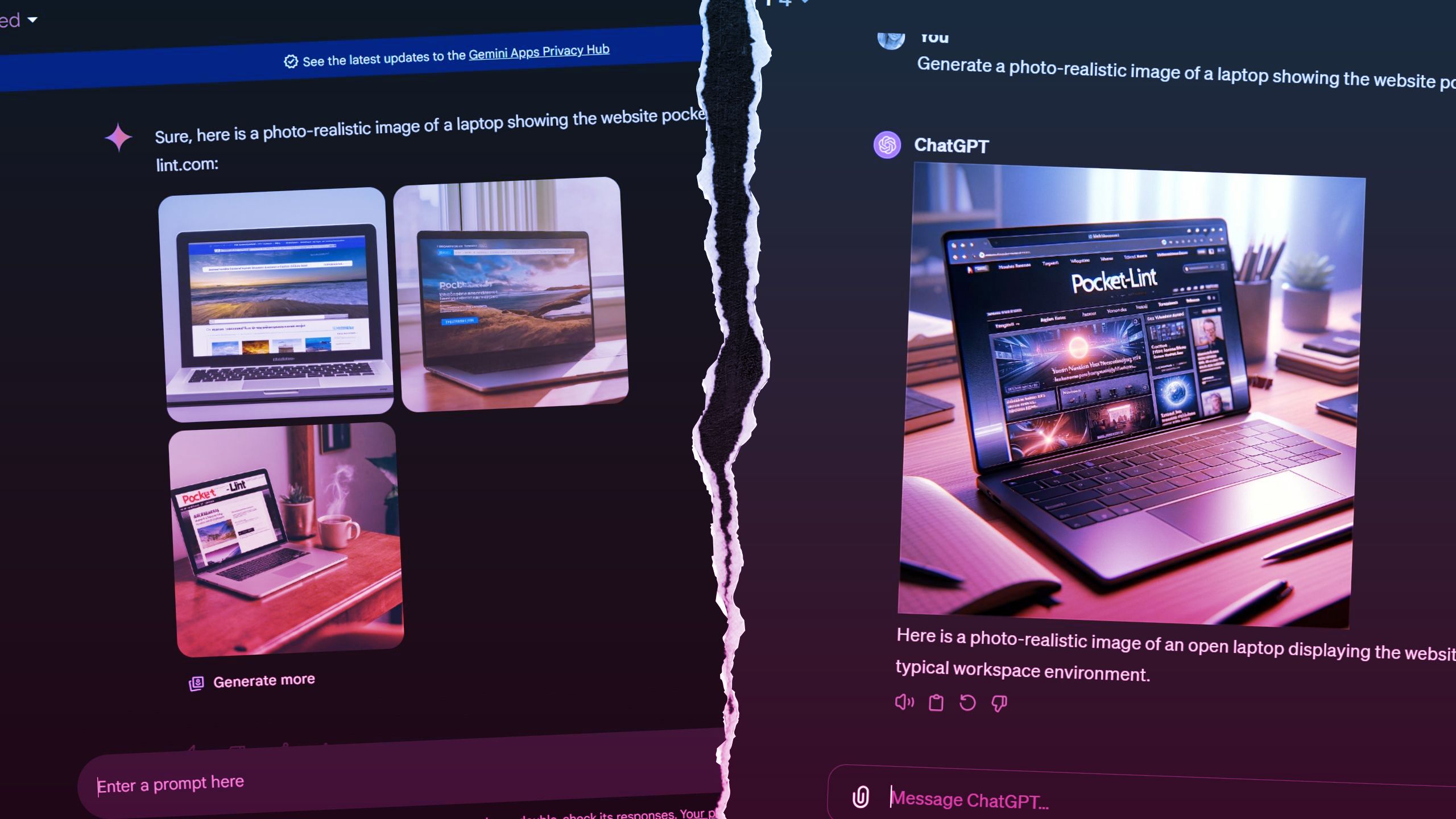
I tested Gemini Advanced against ChatGPT Plus to see which AI is better
I conducted a Gemini Advanced vs. ChatGPT Plus face-off, because I wanted to know which AI chatbot subscription service is actually best.
Writing test: ChatGPT generates detailed writing
But Meta AI uses more organizational tools
When tasked with writing various types of articles, emails, and text, Meta AI and ChatGPT were similar enough that they sometimes produced the exact same subheads. However, there are a few nuances between what each program generated for the same prompts.
I preferred ChatGPT’s attempt at a short story. Its haunted house story was more descriptive, with more showing than telling, and even had some great dialogue. In comparison, Meta AI’s felt a little more cliché with less descriptive storytelling.
Similarly, ChatGPT’s generated articles were more detailed, even when I asked both platforms for some tips on Facebook marketing for small businesses. Meta AI’s generations, on the other hand, tended to be shorter and used more organizational tools for easier skimming, like subheaders and bullet points (which it even added into a cover letter for a fake job application).
Another key difference is that, when asked to generate a research paper, Meta AI generated a list of references where ChatGPT did not. But, ChatGPT’s thesis was more obvious, though that was because it started with “This paper…”. (And no, students should use generative AI for their research papers, but it’s an interesting test to see how the two compare.)

5 new GPT-4o features making ChatGPT better than ever
From real-time voice interaction to vision capabilities and multilingual support, we’re a step closer to Star Trek-style conversational AI.
Advice test: ChatGPT asks follow-up questions
But Meta AI has more current data
ChatGPT’s conversational design meant the chatbot was more likely to ask follow-up questions when I asked for advice. For example, when I asked for travel ideas, it asked what features I was looking for and how far away I wanted to travel from my location, while Meta AI just generated a list of possible camping spots across the entire US.
Similarly, when I asked what camera I should buy, Meta AI assumed I was a beginner (I’m not) and made recommendations accordingly, while ChatGPT compiled some features to consider and then listed a range of options across different categories, like beginners, professionals, and sports.
Meta refused to offer investment advice, whereas ChatGPT offered ten ideas on how I could invest an extra $1,000 a month.
However, Meta AI has the edge in current data. While ChatGPT is sometimes able to use an integrated search tool, its training data only goes up to December 2023. (Interestingly enough, the first time I asked, it told me the data only goes up to September 2021, something that has since changed.) Meta AI, meanwhile, was able to summarize the weekend’s biggest headlines for me.
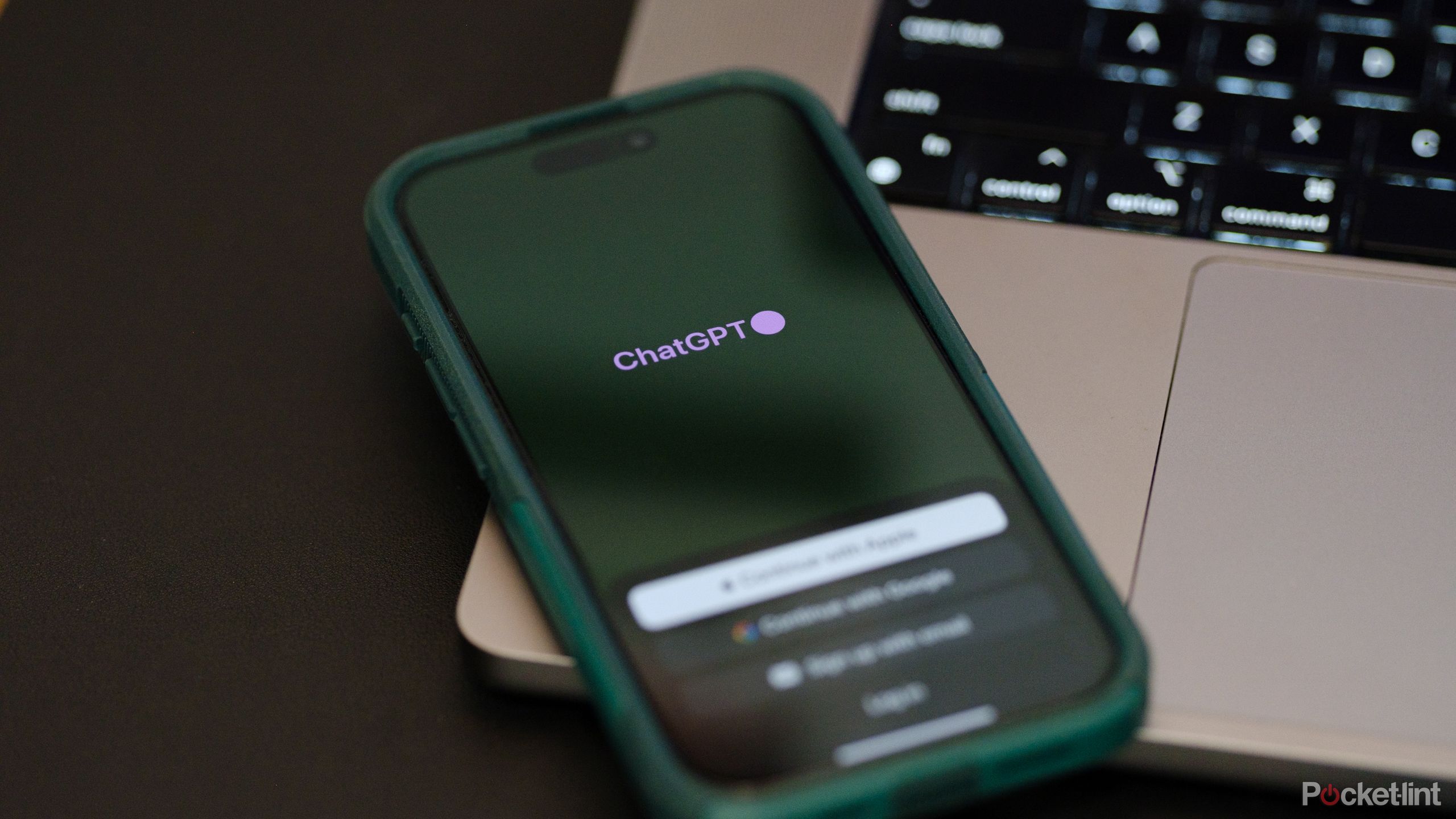
10 ChatGPT prompts to unlock the full power of OpenAI’s chatbot
Want to get the most out of ChatGPT? Try these prompts to unleash its full potential and make the AI work harder for you.
ChatGPT was slower to generate both images and text
Meta AI finished both image and text generation significantly faster. I could often start typing my follow-up question after reading what Meta AI had to say, while ChatGPT was still finishing. This was even using the paid ChatGPT subscription with the faster GPT-4. This could change, however, as the new GPT-4o rolls out, which OpenAI says offers a significant speed improvement.
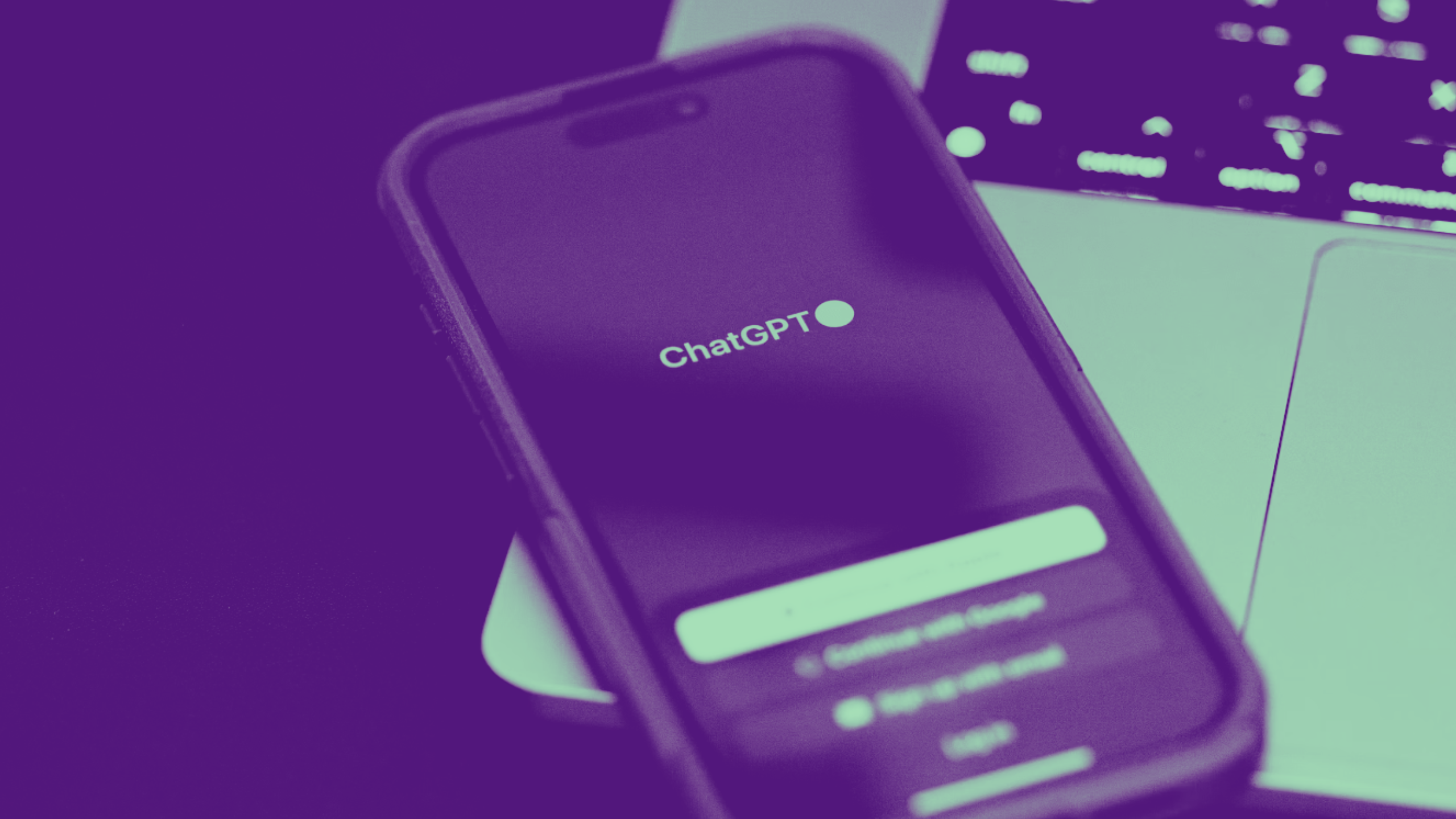
8 ways ChatGPT Plus is better than Gemini Advanced and Copilot Pro
ChatGPT Plus faces stiff competition from Gemini Advanced and Copilot Pro. But I’ve tried all three AI subscription services. Here’s how it’s better.
Ethics test: A mishmash of different standards
Meta AI watermarks images, but ChatGPT refuses to copy an artist-style
enerative AI brings a wealth of ethical debates, but neither platform had a clear edge here.
Meta AI watermarked generative images. Yes, a nefarious user could just Photoshop that out, but at least it’s attempting to make it clear that the images it creates are computer-generated.
However, Meta AI had no problems when I asked it to generate an image in the style of a specific artist (in this example, Banksy), a task that is against ChatGPT’s standards.
I then asked both programs for images of groups of people, looking to see what genders, ethnicities, and ages the platforms would choose to represent. Both produced male-dominated boardroom images, though Meta included more women.
Meta AI included more diverse skin colors, although when I asked for images of “an average-sized woman,” it generated images of thin women, and for some reason, they were all cooking. ChatGPT’s first generated image was of a thin woman, but since ChatGPT generates one where Meta creates four, I asked again and got images of a large-bodied woman (and none of them were cooking).
Meta is more specific about where its training data comes from (and yes, it probably includes your Facebook and Instagram content). ChatGPT, on the other hand, hasn’t published detailed information about its sources for training data.
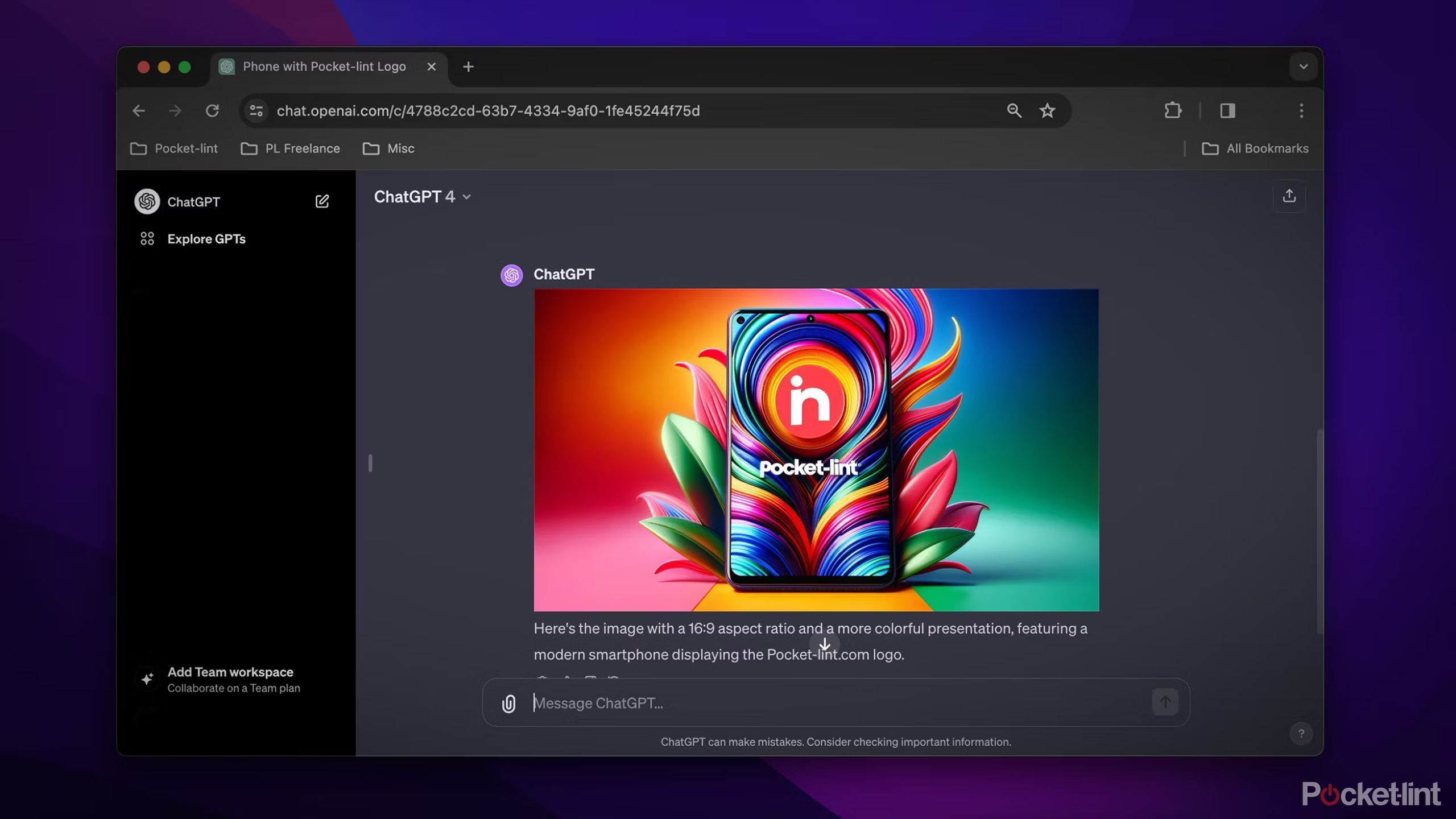
How to use ChatGPT to make AI-generated art and images
Whether you need a stock photo or a portrait of Big Foot, ChatGPT can now use DALL-E AI to generate images. Here’s how, plus tips and tricks.
It’s a toss-up, as both AI platforms have few options to control your data
With ChatGPT’s recent update, controlling your data is now just a simple toggle. This means there is a straightforward way to tell the platform whether it can use your data for training. The only control is simply a toggle to say yes or no to using your input for training. ChatGPT says that individual conversations are not stored after they end.
Meta AI is similarly limited but in the opposite way. The platform has a tool that allows you to manually delete your data (which doesn’t affect your social media). However, it doesn’t have any tools or settings to tell Meta not to use your data in training. In other words, you have to manually delete your data, with no options to automatically remove your AI inputs.
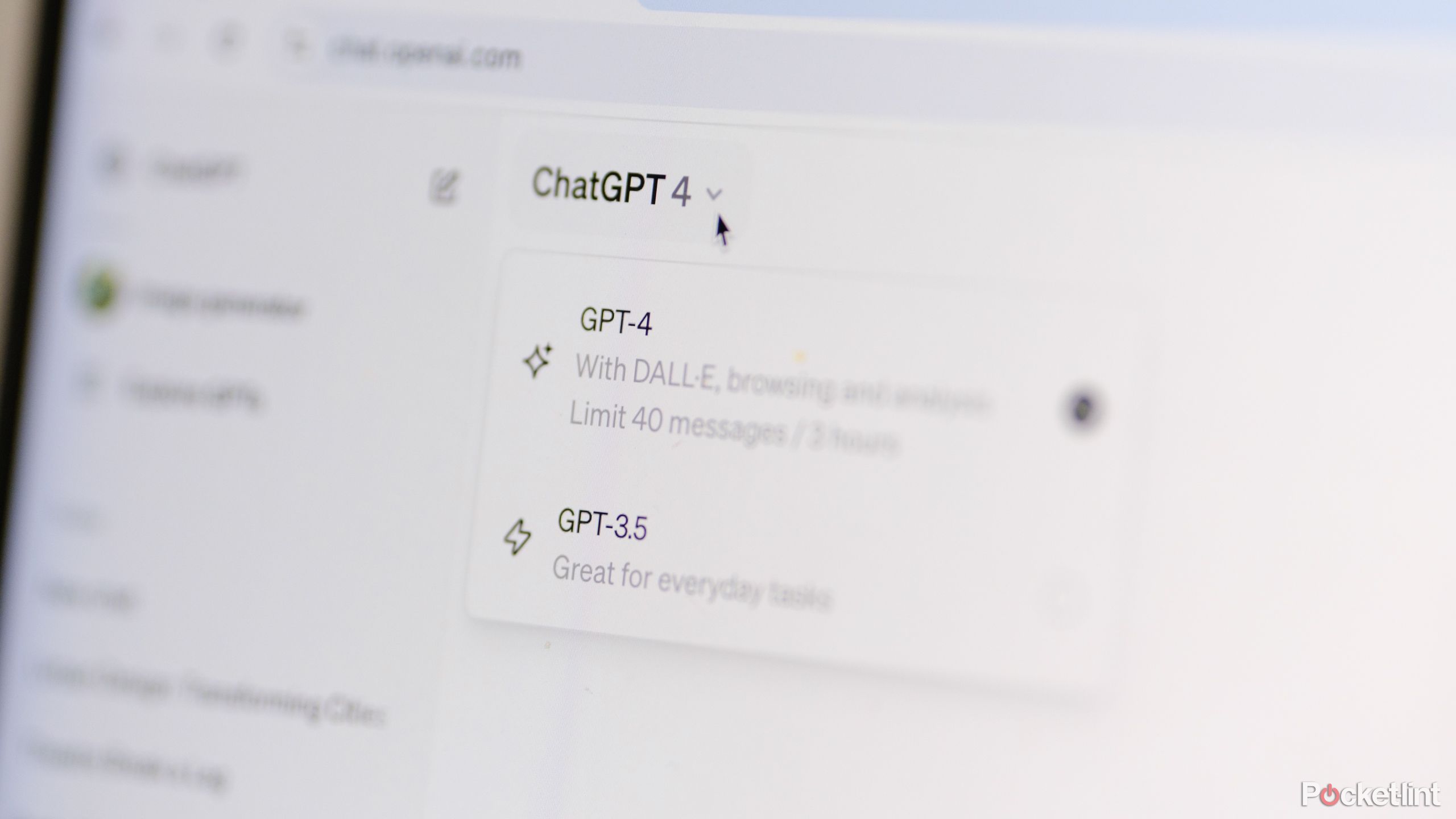
How to master GPT-4 in ChatGPT: Prompts, tips, and tricks
I’ve asked ChatGPT-4 to create everything from poetry to a job application. Here’s what I’ve learned.
But ChatGPT has more custom GPTs
Unsurprisingly, Meta AI is built into Meta’s existing social media platforms. While writing a Facebook post, for example, you can now have AI write it for you or lengthen or shorten it for you. Meta AI is beta testing several more features and promises that users will soon be able to generate stickers with AI or type out a few instructions to have AI edit their Instagram image before sharing. If you want to use Meta AI outside the app, you can use the web browser version that functions similarly to ChatGPT’s. Meta AI also has a few third-party integrations, including HubSpot and Shopify.
ChatGPT has a longer history, and with that comes a wealth of third-party integrations. ChatGPT has GPTs, which are custom AIs designed for a specific purpose. Unlike the general ChatGPT, these GPTs are custom-tailored for specific tasks, like tutoring you in math, suggesting improvements to your writing, or creating Excel spreadsheets. ChatGPT also has numerous plugins, like Instacart and Kayak. You can also use a Google Chrome extension to use the AI within a web browser.
A key area where ChatGPT has the advantage is the different types of input it can handle. ChatGPT can understand audio input. You can talk to the mobile app and get a verbal response back, whereas Meta AI is limited to written text. ChatGPT will also allow you to upload files, opening up the possibility for tasks like describing an image or summarizing a large document for you.
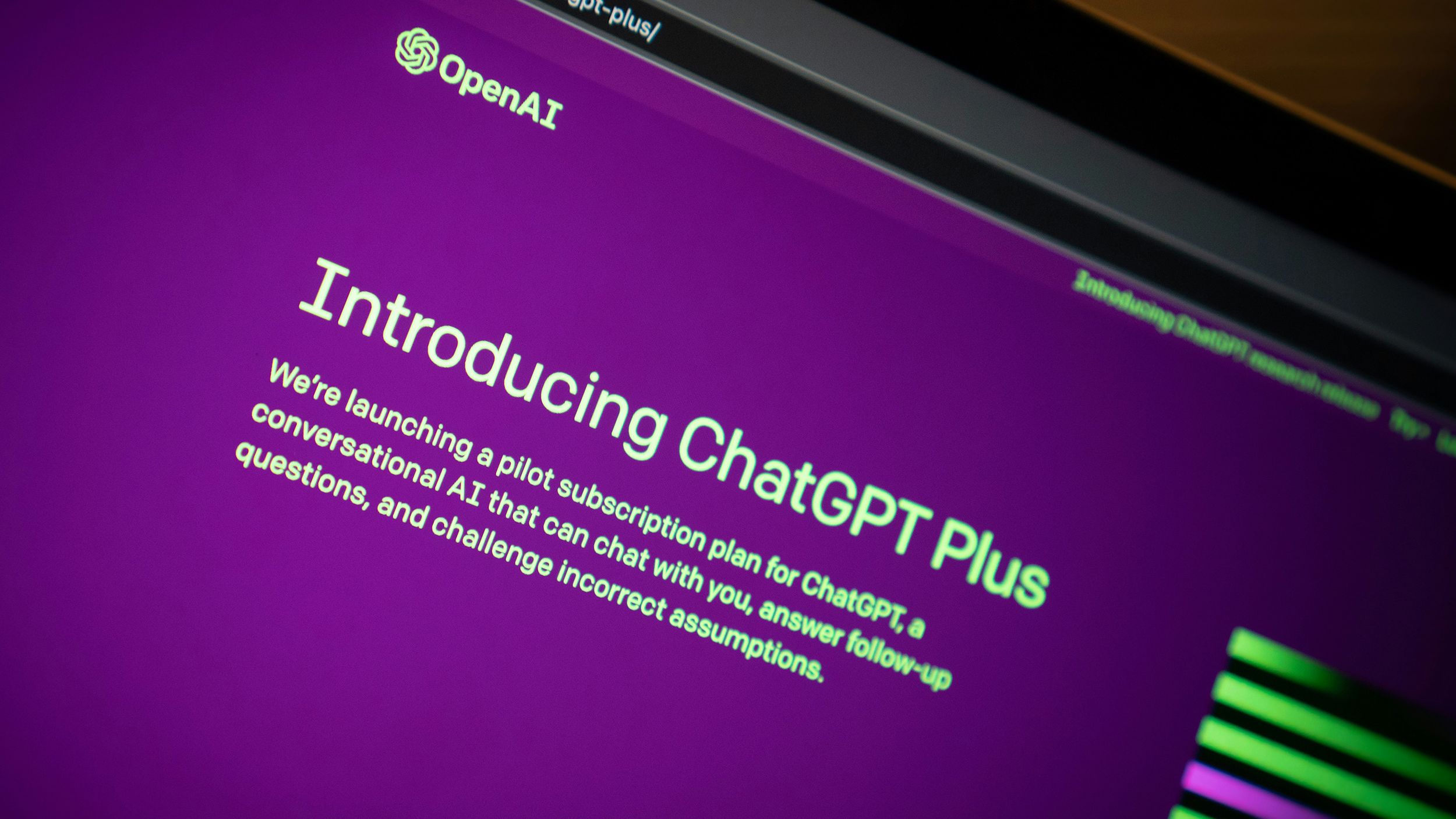
I tried ChatGPT Plus. Here’s everything it can do
ChatGPT Plus is for those who want a reliable, efficient ChatGPT experience. But, for $20 monthly, what else does it include?
ChatGPT has a clear advantage in generating more detailed writing
While ChatGPT has been around longer, Meta AI is the faster program of the two. Meta’s platform is also able to access current, up-to-date information. The images it generated were also more realistic. Best of all, you don’t have to pay anything for Meta AI, even if you want to generate images.
However, Meta AI is limited and only accepts text input — you can’t talk to it or upload files. ChatGPT can have an actual auditory conversation with you or read the files that you upload. While Meta AI finished first, ChatGPT did a better job of listening to instructions when generating images in a certain aspect ratio. Its tendency to ask follow-up questions also meant it tended to provide better advice. And while I preferred the style of the images that Meta AI generated, ChatGPT tended to generate better text results.
Are those differences worth spending an extra $20 for what Meta AI does faster and for free? For a lot of users, probably not, though power users will appreciate ChatGPT’s more detailed text generation and the ability to talk to the chatbot rather than type.
Trending Products

Cooler Master MasterBox Q300L Micro-ATX Tower with Magnetic Design Dust Filter, Transparent Acrylic Side Panel…

ASUS TUF Gaming GT301 ZAKU II Edition ATX mid-Tower Compact case with Tempered Glass Side Panel, Honeycomb Front Panel…

ASUS TUF Gaming GT501 Mid-Tower Computer Case for up to EATX Motherboards with USB 3.0 Front Panel Cases GT501/GRY/WITH…

be quiet! Pure Base 500DX Black, Mid Tower ATX case, ARGB, 3 pre-installed Pure Wings 2, BGW37, tempered glass window

ASUS ROG Strix Helios GX601 White Edition RGB Mid-Tower Computer Case for ATX/EATX Motherboards with tempered glass…



